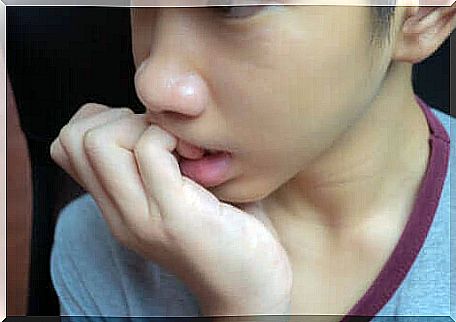Dermatophagia In Children: Causes And Treatment – You Are Parents

No two children are the same or one personality type that is considered normal and appropriate. Some children are calmer and carefree, while others are more nervous and have more energy. In this case, it is possible, as an adult, not to notice certain risky behaviors which can be manifestations specific to his agitated personality. This is the case with dermatophagy which we will talk about today.
We all know children, and even adults, who bite their nails regularly. This habit is relatively widespread and normalized in our society and we do not give it enough importance.
However, it is one manifestation, among many others, for dealing with the difficulties of anxiety or worry. Dermatophagia is another. By knowing what is behind it, we will be better able to help our children stop this type of behavior.

What is dermatophagia?
Dermatophagia is the habit of biting the skin repeatedly. Children usually bite their skin with their fingertips or around the cuticles. They can also bite the skin on the inside of the cheeks or the skin of the lips.
As a result of this act, it results in various lesions such as ulcers or bleeding with red sores that get worse over time. After a while, children usually have their fingers “raw”, which gives parents alarm.
What are the causes ?
Looking at the wounds on their children’s skin, parents find it difficult to understand why their little ones resort to seemingly harmful and painful behavior. This is why it is necessary to understand the mechanism behind dermatophagy.
First of all, you should know that this is a nervous habit. It occurs more often in children who have an anxious personality or who suffer from an anxiety disorder.
For example, generalized anxiety disorder -TAG- or social phobia. However, it can also be from a specific event in the child’s life that caused anxiety.
We can compare the feeling that children have with what we feel before sneezing. Namely, itching or discomfort so strong that it is relieved only by sneezing.
Something similar happens in this case: the child feels an increasing anxiety which disappears by biting his skin, when he experiences great relief as well as a pleasant sensation of pleasure. This is why, it can be so difficult for the little ones to resist the urge to keep biting each other.
On the other hand, dermatophagia acts as a tool for dealing with anxiety. By biting their fingers or cheeks, nervousness temporarily decreases and children tend to regulate themselves in this way.
The problem becomes worse when it becomes a habit and the child begins to bite his skin, not only when he is anxious, but also when he is bored or distracted. It then becomes an automatic gesture of which the child is not even aware.

What is the treatement ?
If you detect this behavior in your child, it is necessary to act. First of all, to prevent it from leading to skin damage. Then, to teach the child new, healthier and more effective coping strategies. In addition, it is fundamental to understand the origin of his anxiety. Is it generated by an isolated event or by a disorder ?
It may be that the child actually suffers from generalized anxiety or it is a question of an academic failure which favored his anxiety in a punctual way.
You can teach him techniques to regulate his agitation, such as breathing or relaxation exercises. Likewise, it is important to provide the child with tools to solve future problems so that he does not feel overwhelmed by the circumstances that he will encounter.
But above all, the most effective technique for directly treating dermatophagia is habit reversal. This causes the child to adopt incompatible behavior whenever he detects the desire to bite his skin.
For example, he may sit on the hand for a few moments until the urge subsides. In any case, a child psychologist will be helpful to assess each specific case and apply the most effective treatment.









